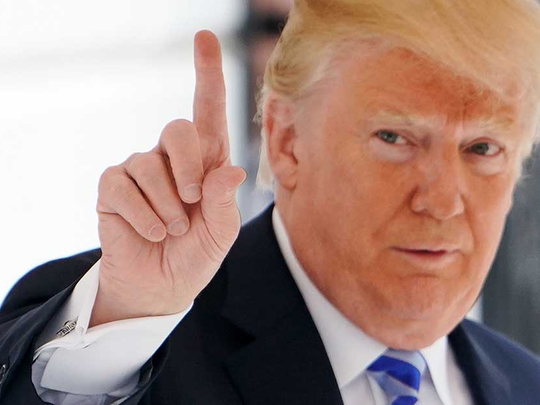
President Donald Trump's administration moved the US to the brink of a trade war with China, an-nouncing tariffs on $50 billion in Chinese imports that America's biggest trading partner vowed to retal-iate against.
The response from China signaled a rapid escalation of the dispute. China will impose tariffs with "equal scale, equal intensity" on imports from the US and all the consensus the two sides reached ear-lier will lose effect, the Commerce Ministry said in a statement on its website late Friday that was later removed. In an emailed statement, Trump pledged additional tariffs if China follows through on the retaliation threats.
#BREAKING China to impose equal tariffs on US imports in retaliation, commerce ministry says pic.twitter.com/Uy9ZsnxPEg
— AFP news agency (@AFP) June 15, 2018
The first wave of tariffs will total $34 billion and take effect July 6, with another $16 billion still to be re-viewed, the US Trade Representative said in a separate statement. The USTR's final list includes 1,102 product lines including robotics, aerospace, industrial machinery and automobiles. Not included are consumer goods including mobile phones and televisions.
"The United States can no longer tolerate losing our technology and intellectual property through un-fair economic practices," Trump said.
US stock futures declined, and haven assets such as the yen and Treasuries rallied after the an-nouncement. The yen strengthened 0.1 per cent to 110.46 against the US dollar, while benchmark 10-year Treasury yields dropped roughly 3 basis points to 2.9077 percent as of 8:41 am in New York.
Criticism from the American business community came swiftly.
Wrong Approach
"Imposing tariffs places the cost of China's unfair trade practices squarely on the shoulders of Ameri-can consumers, manufacturers, farmers, and ranchers. This is not the right approach," Thomas Donohue, president of the US Chamber of Commerce, said in an emailed statement.
China, the world's No. 2 economy behind the US, has pledged to retaliate on US exports including soy-beans and pork. The US imported $505 billion of goods from China last year and exported about $130 billion, leaving a 2017 deficit of $376 billion, according to government figures.
Trump has frequently cited such an imbalance as the justification for a punitive trade policy toward China, Canada, Mexico, the European Union and other trading partners.
"These tariffs are essential to preventing further unfair transfers of American technology and intellec-tual property to China, which will protect American jobs," the president said in his statement Friday. "In addition, they will serve as an initial step toward bringing balance to the trade relationship between the United States and China."
Technology Race
The move is a response to the USTR's so-called Section 301 investigation earlier this year that accused China of stealing U.S. intellectual property in an effort to dominate the development of advanced technology.
Trump is shaking up the world economic order with his zeal for tariffs and embrace of trade conflict. He threw a meeting of the Group of Seven into turmoil by revoking support for the group's joint state-ment and berating the summit's host, Canadian Prime Minister Justin Trudeau.
So far, the US has imposed tariffs on steel and aluminum imports. Economists expect the direct impact on the U.S. economy to be modest. But if the president follows through on all the duties he's threat-ened, including the tariffs against China, US inflation could accelerate by 15 basis points, according to Goldman Sachs.
Trump's tariffs may also influence his efforts to bring peace to the Korean peninsula. Beijing is an im-portant player in talks with North Korea on abandoning its nuclear-weapons program.
The president has been under pressure from US lawmakers over his decision to soften a penalty on Chinese telecom-equipment maker ZTE Corp. In April, the US banned the ZTE from buying American technology for seven years, effectively putting the company out of business. But Trump said this month ZTE could avoid the ban if it paid at least $1 billion in penalties, among other things. US senators are seeking ways to block the deal in Congress.












